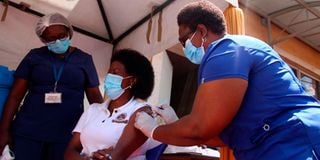Now vaccine apathy dents war on Covid

TSC CEO Nancy Macharia receives Covid-19 jab in Nairobi on March 11.
Vaccine apathy in Kenya may stifle the war against Covid-19 as the third wave of the pandemic takes shape.
By Saturday, only 9,144 healthcare workers from 40 counties across the country had been vaccinated.
Kenya aims to vaccinate 1.25 million people by June, starting with healthcare workers, followed by security personnel and then teachers, and by September, at least 9.6 million Kenyans should have been vaccinated, according to Ministry of Health projections.
However, lack of interest and fear of the side effects, in addition to the fact that the vaccine is not mandatory, may hamper efforts to attain the targets, experts have said.
According to Dr Githinji Gitahi, the group CEO of Amref Health Africa, Kenyans have been skeptical and this may cripple efforts to contain the virus.
“The level of scepticism and lack of trust in the government is too much. However, this is not about the government, but our lives. It is an individual’s decision of whether or not to protect loved ones,” he said during an interview.
He said Kenyans should learn to trust health and medical experts, “We give scientific information and it is upon Kenyans to take it. The level of scepticism towards the Covid-19 vaccine is uncalled for.
Get vaccinated
“People need to believe in science, the vaccine is being administered elsewhere in the world, it has been tested. If your turn comes, go and get vaccinated,” said Dr Gitahi.
But many Kenyans have expressed fears of possible severe side effects. Dr Andrew Were Onyino, the president of the Kenya Medical Association (KMA), in an interview, said doctors who have been vaccinated are reporting the expected side effects.
“The side effects doctors have reported are not out of the ordinary. They are reporting headaches, fever, fatigue and pain at the site of the jab.
“One doctor reported to have developed rashes but they have subsided and no serious side effects have been reported to warrant hospitalisation,” he said.
Other side effects include chills, redness at the site of injection (which is not very common), joint pain, and muscle pain.
Nausea and acute peripheral facial paralysis are not common, he said. “In collaboration with the Ministry of Health, KMA is monitoring any serious Covid vaccine effects, but at the moment, Kenyans should not fear to get vaccinated, said Dr Were.
Teachers
“This vaccine has been studied by our experts and there is no need to fear. Healthcare workers, security officers and teachers should continue with the vaccination.”
The AstraZeneca vaccine, which is currently being used in Kenya, has been suspended in several Scandinavian nations after cases of pulmonary embolism (blood clots in the lungs) were reported.
But the World Health Organization (WHO) has backed the vaccine,, saying there is no reason to stop using it.
On Friday last week, WHO spokeswoman Margaret Harris said there was no link between the vaccine and the blood clots reported.
Currently, Nairobi is leading in the number of healthcare workers who had received the vaccine by Saturday, at 2,020, followed by Uasin Gishu at 1,304.
At the Coast, which received 26,000 doses, fewer health workers have turned up for vaccination, with their unions noting that poor information around the vaccination drive, coupled with rising safety concerns, are the biggest turn-offs. Mombasa, Tana River and Taita Taveta have recorded low uptake.





